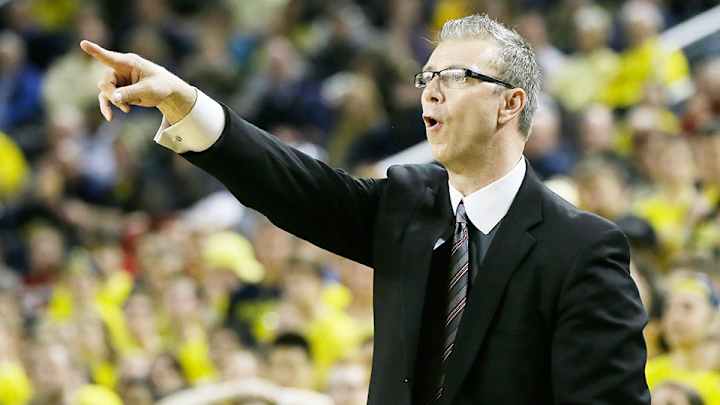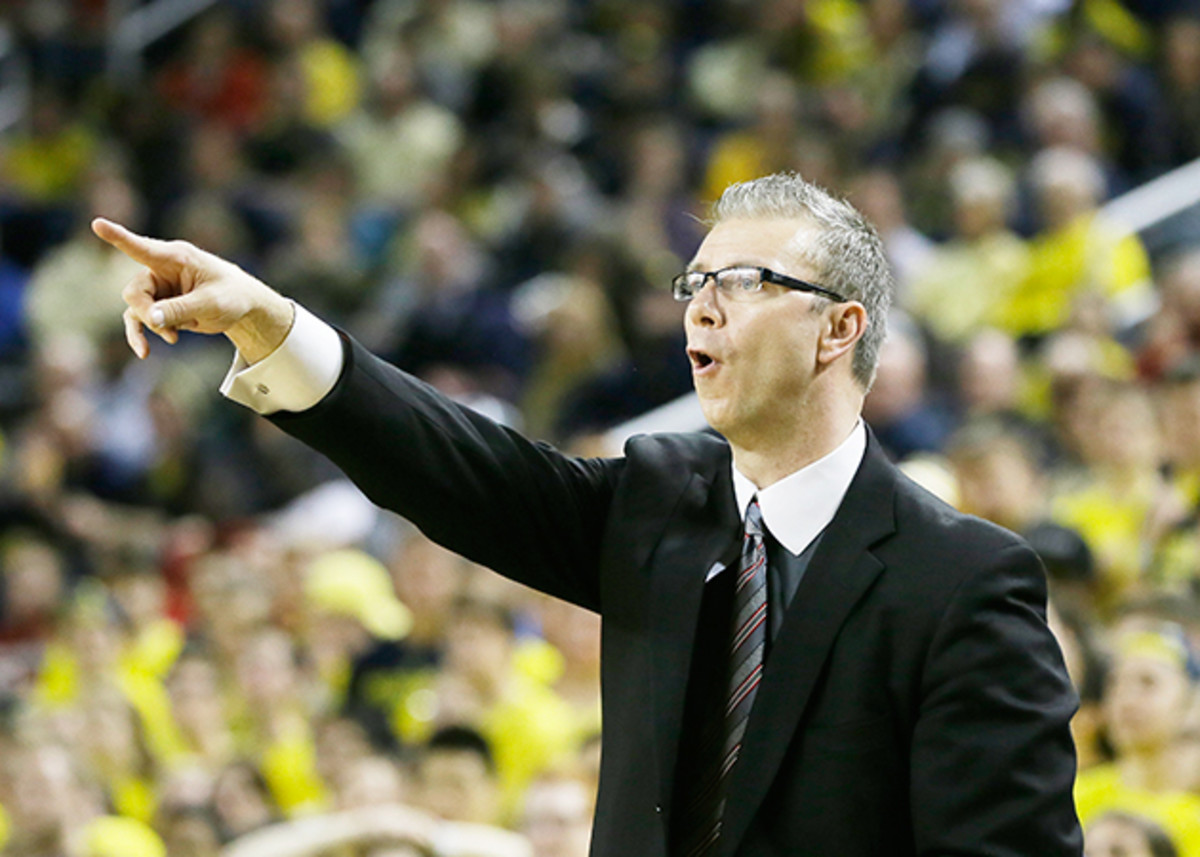Q&A with new Stony Brook coach Jeff Boals

With the 2016 college basketball coaching carousel nearing its conclusion, SI.com is checking in with all the major hires about their new gigs. These Q&As will be posted periodically throughout April, May and June. Next up is Jeff Boals, who spent seven seasons as an assistant coach at Ohio State before being named the head coach at Stony Brook. Boals helped the Buckeyes win 193 games and three Big Ten regular-season championships. He replaces Steve Pikiell, who left Stony Brook for the same position at Rutgers.
Sports Illustrated: What have the first couple weeks on the job been like?
Jeff Boals: It’s actually been a crazy whirlwind. You can go to any symposium and talk to people about what it’s like to become a first-time head coach, but there’s nothing that anyone can tell you that’s going to prepare you. It’s a situation where, going from Ohio to Long Island, I’d never been up there before. So the area is new to me. The toughest part, personally, is you leave your wife and your kids behind. You go and take the job and go to a press conference, and then, boom: You’re up there.
So your wife has to take care of the house, and she has a full-time job. And your kids have to finish schools and their activities. So personally, that’s the toughest part.
But being at Ohio State for seven years, the way Thad lets his assistants do things, has prepared me for this situation. Initially, when you take the job, it’s scheduling, it’s recruiting, it’s finishing the semester. Then you have two April evaluation periods. There is so much going on at once.
SI: Had you spent any significant time in Long Island before the interview process? Or has your wife? Did she come with you to the interviews?
JB: No, she didn’t. She came for the press conference. When I went up for the interview, I was there for Thursday and then Friday morning. I had a chance to drive around for a couple hours and see the area. My wife is from what I like to call Canada, New York, up in Plattsburgh. And she went to school at Boston University and grad school at Syracuse. She’d lived on the East Coast, but neither one of us has spent any time in Long Island.
SI: That kind of pressure seems like the most nerve-wracking part of the experience. You’re deciding where your family will live.
JB: Luckily for me, I’m staying up in a hotel right now. And then she is going to fly into a city on May 4 for her job, to do some things. And then she is going to drive over and we’ll look at houses together.
Q&A with new Vanderbilt coach Bryce Drew
SI: So going back to your start in coaching. You moved into it pretty quickly after you were done playing. Was that always the plan?
JB: I always tell people that I fell into coaching—literally. I blew out my third ACL 20 games into my senior year. We were 16–4. I wanted to be a physical therapist—I was a biology major. At the end of the year, my head coach was Larry Hunter, who is at Western Carolina now, and he had an assistant leave. He asked me if I’d be interested in coaching. Like most 22-year-olds, I had no idea what I wanted to do in life, so I was like, sure. At that time, I was a restricted-earnings coach. I got into and really enjoyed that part of it—seeing it from a different side. And now I’m starting Year 22 in coaching.
SI: You stayed pretty geographically close to Ohio for most of your career. Was that planned or just a coincidence?
JB: No, my wife always jokes that all of our moves are in a big circle, in the Midwest. It just kind of worked out that way. I left Ohio and went to University of Charleston in West Virginia. Then I went up to Robert Morris with Mark Schmidt, then over to Akron and down to Ohio State. I think it was just kind of coincidence, the way it worked out.
It was good from a family perspective. My mom and dad were still around. And I actually met my wife in Charleston. She was working in Pittsburgh at the time. So it’s worked out pretty well. It’s kind of one of those deals where you’re stepping out of your comfort zone, which is good.
SI: Speaking of comfort zone—I know how much you loved Ohio State. What about Stony Brook made you want to take the leap?
JB: Thad always told me: “Don’t leave here for a bad job.” My name was floating around for a lot of jobs that I wasn’t even involved with—I think it was just part of the territory. With Stony Brook, I got a phone call and asked if I was interested, and I said, “Yeah, definitely.” I didn’t know much about them other than they’d been to the tournament this year and had been successful. As soon as I had my first initial conversation with the AD, Shawn Heilbron, I really sensed the passion and energy he had for the university. He’s been there two years and is going on the third.
We had great synergy on the phone, and then he asked if we could sit down at the Final Four. So we met, and it was just two hours of me taking in his energy and his passion and his vision. He’s an outside-the-box thinker. The passion and energy he has is exactly what I was looking for.

SI: I think what a lot of people don’t realize about Stony Brook is that the alumni have money, and the facilities at the school are really good for the level of basketball.
JB: When I went up on my interview, I didn’t even go to the facilities. It was just on campus, meeting with the president and the AD. No. 1, I didn’t know going in that it’s a great academic institution. It’s a lot like Ohio State, being public research. Once I got to the facilities, I was blown away. It’s a relatively new arena and it holds about 4,000 people. We have a video room, a nice locker room, a brand new weight room. When you’re walking around, you have a sense like, your facilities are going to be a step above teams your recruiting against.
And the campus is almost like a Midwest campus. It had that feel to it. I was surprised in a really good way with the campus and the facilities.
SI: With what you’re able to offer, what has the reception been like in your transition from Ohio State to Stony Brook?
JB: It’s overwhelming. You don’t realize until something like that happens, the amount of friends you have. You come across people and develop relationships from every spot along the way—and not only in basketball, other coaches and administrators and former players, too. It was really overwhelming to hear from those guys and know that they had something to do with your success.
As soon as it hit the national wire at 12:30, and I was using my cell phone as a GPS. And then I got a phone call as I was supposed to take a left or a right at a fork in the road. I went left when I should have gone right, and that put me like 30 minutes later catching my flight. But it was just overwhelming. When you treat people the right way along the course of 20 years of coaching, you realize it’s a people business.
SI: New York driving, huh?
JB: I was just going to look at it, but before I could hit decline, I had to change lanes, with the call coming.
SI: When it comes to recruiting, you’re in a pretty competitive market in the northeast. What’s your strategy for making sure Stony Brook gets the right players?
JB: There are a lot of schools, but there are a lot of players in the tri-state area. You have a radius of about three hours that has a lot of kids. But you also have an institution like Stony Brook where you can get kids from other places. I think the biggest thing is getting kids on campus and out to Long Island. When they see it, they’ll be as impressed as I was with the campus and the facilities and the people.
It’s one of those deals where you recruit and get one or two guys you shouldn’t be able to get. You’re selling an opportunity and a situation, and if you look at it, there have been about 1,100 transfers in the past two years. There, you can sell the fit and the opportunity to win. There are a lot of times when kids aren’t winning or they get over-recruited, and they want to transfer immediately.
So like I said, I’ll be who I am. A lot of times, in an official visit, you can try to diagram how everything is going to be in a perfect scenario, but I don’t want to be a person where a kid gets to campus and calls home and says, “You remember the guy that recruited me? That’s not the guy who’s coaching me.” That’s where you get into trouble. I’m going to be who I am and try to get as many kids to campus as possible. I want high-character guys who want to win and get their degree.
Q&A with new Saint Louis coach Travis Ford
SI: You just lost the most successful seniors in school history, led of course by Jameel Warney. Who do you see as your foundation moving forward?
JB: The first thing I did when I became the head coach: I tried to find every minute that Jameel Warney didn’t play and tried to appeal for like an extra half a season. He was phenomenal. He could have started for almost any team in the country. He’s a phenomenal person, and he’ll have an opportunity to make a lot of money someday. I think going forward, you lose your top three guys—Ray McGrew, Carson Puriefoy and Jameel Warney. Guys were in a culture where they won a championship, but they’ll have to play a different role. The guys who are returning have to step up their game and get better.
We have two freshmen coming in—a point guard and a wing. And we have one scholarship available that we are going to use to get an impact guy.
SI: Last question: You’re transitioning from a big-time basketball league in the Big Ten to a one-bid league in the America East. Is it a scary thought going into a bid where a conference tournament defines your season, essentially?
JB: I played at a mid-major school, and I’ve coached at them. A lot of times it comes down to those three games in March. You try to put yourself in the best situation possible by scheduling big games and hopefully winning them. But I mean, if you look at Monmouth this year, they almost did everything everyone tells you to do, scheduling-wise. They won the games they should have, and they didn’t get in. You look at St. Bonaventure, which had [a 30 ranking in the RPI]—I don’t think there’s an exact science. But winning will take care of everything.
The thing with the mid-major leagues: You don’t have the opportunities to get a good win during the conference season that you have during the high-majors.
SI: Anything else you wanted to say?
JB: You know, I left a dream job at Ohio State, and especially with leaving Coach Matta. And like he told me, don’t leave for a bad job. I definitely didn’t do that. I think this is a great opportunity.
